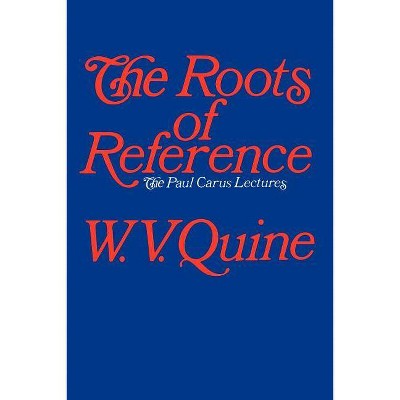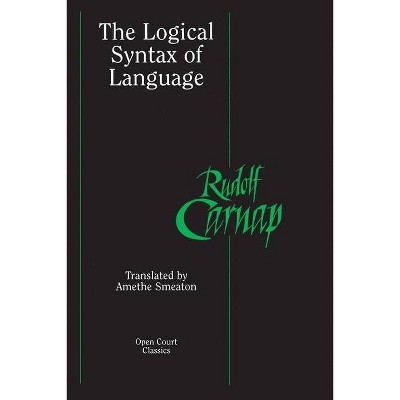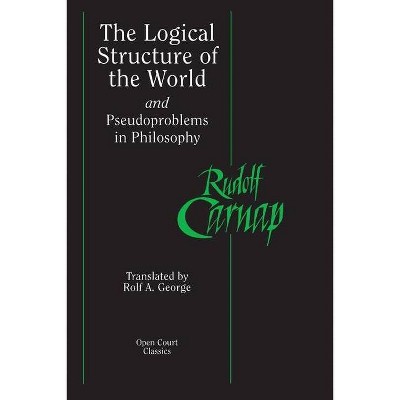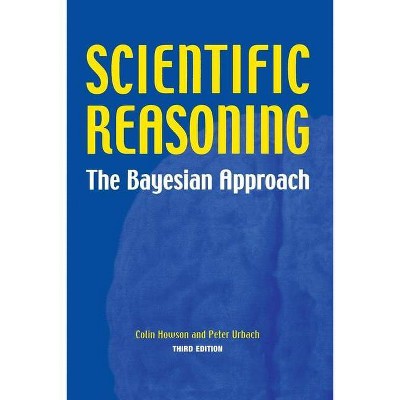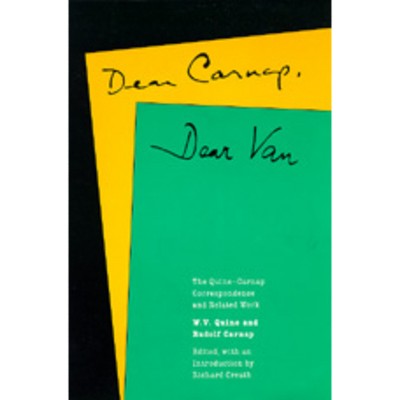Carnap, Tarski, and Quine at Harvard - (Full Circle: Publications of the Archive of Scientific Philo) by Greg Frost-Arnold (Paperback)

$36.58 sale price when purchased online
$49.95 list price
Target Online store #3991
About this item
Highlights
- During the academic year 1940-1941, several giants of analytic philosophy congregated at Harvard, holding regular private meetings, with Carnap, Tarski, and Quine.
- About the Author: Greg Frost-Arnold is assistant professor in the Philosophy Department at Hobart & William Smith Colleges.
- 270 Pages
- Philosophy, Movements
- Series Name: Full Circle: Publications of the Archive of Scientific Philo
Description
About the Book
During the academic year 1940-1941, several giants of analytic philosophy congregated at Harvard, holding regular private meetings, with Carnap, Tarski, and Quine. "Carnap, Tarski, and Quine at Harvard" allows the reader to act as a fly on the wall for their conversations. Carnap took detailed notes during his year at Harvard. This book includes both a German transcription of these shorthand notes and an English translation in the appendix section. Carnap's notes cover a wide range of topics, but surprisingly, the most prominent question is: If the number of physical items in the universe is finite, what form should scientific discourse take? This question is closely connected to an abiding philosophical problem: What is the relationship between the logico-mathematical realm and the material realm? Carnap, Tarski, and Quine's attempts to answer this question involve issues central to philosophy today.This book focuses on three such issues: nominalism, the unity of science, and analyticity. In short, the book reconstructs the lines of argument represented in these Harvard discussions, discusses their historical significance (especially Quine's break from Carnap), and relates them when possible to contemporary treatments of these issues.Book Synopsis
During the academic year 1940-1941, several giants of analytic philosophy congregated at Harvard, holding regular private meetings, with Carnap, Tarski, and Quine. Carnap, Tarski, and Quine at Harvard allows the reader to act as a fly on the wall for their conversations. Carnap took detailed notes during his year at Harvard. This book includes both a German transcription of these shorthand notes and an English translation in the appendix section. Carnap's notes cover a wide range of topics, but surprisingly, the most prominent question is: If the number of physical items in the universe is finite, what form should scientific discourse take? This question is closely connected to an abiding philosophical problem: What is the relationship between the logico-mathematical realm and the material realm? Carnap, Tarski, and Quine's attempts to answer this question involve issues central to philosophy today.This book focuses on three such issues: nominalism, the unity of science, and analyticity. In short, the book reconstructs the lines of argument represented in these Harvard discussions, discusses their historical significance (especially Quine's break from Carnap), and relates them when possible to contemporary treatments of these issues.Review Quotes
"This book presents the results of a genuine breakthrough in our understanding of the development of analytic philosophy in the twentieth century: the discovery by Greg Frost-Arnold of Carnap's notes recording extensive discussions with Tarski and Quine in 1940-41. Frost-Arnold's very careful and illuminating analysis of these discussions will be of great interest to all students of the analytic tradition."
-MICHAEL FRIEDMAN, Stanford university "In 1940-41 Carnap, Tarski, and Quine met at Harvard to discuss fundamental issues. Thanks to this book we can now attend those discussions as well. Frost-Arnold goes beyond the recorded word to reconstruct in vivid terms the nuanced ideas of these three philosophic giants and, in addition, to tie those ideas to philosophic discussions that are still going on today. The book is a major achievement."
-RICHARD CREATH, Arizona State University "In the 1980s a generation of eminent scholars pioneered the study of the history of analytic philosophy. In the last two decades, a younger generation of scholars has pushed the project forward by tapping the archives of the key thinkers in the analytic tradition. Of the many findings that have resulted from these efforts, the most exciting is arguably the discovery of the Carnap notes, amounting to more than eighty typescript pages, describing the conversations that took place at Harvard, in 1940-1941, between Carnap, Quine, and Tarski. During that year, these three giants of analytic philosophy had regular meetings discussing, among other things, the problem of the analytic/synthetic distinction and the prospects for a nominalist foundation of mathematics and science. In this superb book, Greg Frost-Arnold provides a rich and subtle discussion of these notes. In addition, he has put us in his debt by accurately editing and translating the notes. As in the case of the best people working in the history of analytic philosophy, the engagement with history is for Frost-Arnold, at the same time, an engagement with our own situation. And he is successful in bringing the material contained in the Carnap notes to life by showing their relevance to contemporary discussions in philosophy of mathematics and logic."
-PAOLO MANCOSU, UC Berkeley "Carnap, Tarski and Quine met together in 1940-1941 at Harvard to discuss their views on the nature of language and the differences between logic, mathematics and science. In this remarkable book Greg Frost-Arnold presents Carnap's extensive notes on these meetings. Frost-Arnold also includes an elegant translation and a detailed commentary that sets the notes in their philosophical context and demonstrates their importance for many central debates about the history of analytic philosophy. This book marks a decisive advance in our understanding of the philosophical views of Carnap, Tarski and Quine, and is essential reading for all who work on these topics."
-CHRISTOPHER PINCOCK, The Ohio State University "Some of the most influential positions in analytical philosophy resulted from debates that found only partial reflection in the publications of their protagonists. On the basis of archival sources Greg Frost-Arnold reconstructs and analyzes, in unprecedented detail and with good judgment, one of these seminal debates, providing many valuable insights into the development of ontology and philosophy of language at mid-century and into the long-lasting debate about analyticity."
-THOMAS UEBEL, University of Manchester
About the Author
Greg Frost-Arnold is assistant professor in the Philosophy Department at Hobart & William Smith Colleges. He is associate editor for the Journal of the History of Analytical Philosophy.Dimensions (Overall): 9.0 Inches (H) x 6.0 Inches (W) x .7 Inches (D)
Weight: .9 Pounds
Suggested Age: 22 Years and Up
Number of Pages: 270
Genre: Philosophy
Sub-Genre: Movements
Series Title: Full Circle: Publications of the Archive of Scientific Philo
Publisher: Open Court
Theme: Analytic
Format: Paperback
Author: Greg Frost-Arnold
Language: English
Street Date: August 27, 2013
TCIN: 94421104
UPC: 9780812698305
Item Number (DPCI): 247-20-6910
Origin: Made in the USA or Imported
If the item details aren’t accurate or complete, we want to know about it.
Shipping details
Estimated ship dimensions: 0.7 inches length x 6 inches width x 9 inches height
Estimated ship weight: 0.9 pounds
We regret that this item cannot be shipped to PO Boxes.
This item cannot be shipped to the following locations: American Samoa (see also separate entry under AS), Guam (see also separate entry under GU), Northern Mariana Islands, Puerto Rico (see also separate entry under PR), United States Minor Outlying Islands, Virgin Islands, U.S., APO/FPO
Return details
This item can be returned to any Target store or Target.com.
This item must be returned within 90 days of the date it was purchased in store, shipped, delivered by a Shipt shopper, or made ready for pickup.
See the return policy for complete information.
Trending Poetry

Bestseller
$24.48
MSRP $35.00
Buy 2, get 1 free select books, movies, music & Funko
4.7 out of 5 stars with 26 ratings

Bestseller
$14.39
Buy 2, get 1 free select books, movies, music & Funko
3.8 out of 5 stars with 62 ratings

$22.80
was $26.60 New lower price
Buy 2, get 1 free select books, movies, music & Funko
5 out of 5 stars with 4 ratings

Highly rated
$9.85 - $23.09
MSRP $15.99 - $32.99
Buy 2, get 1 free select books, movies, music & Funko
4.8 out of 5 stars with 137 ratings

$23.09
Buy 2, get 1 free select books, movies, music & Funko
3.8 out of 5 stars with 13 ratings

$23.09
Buy 2, get 1 free select books, movies, music & Funko
4.4 out of 5 stars with 11 ratings
